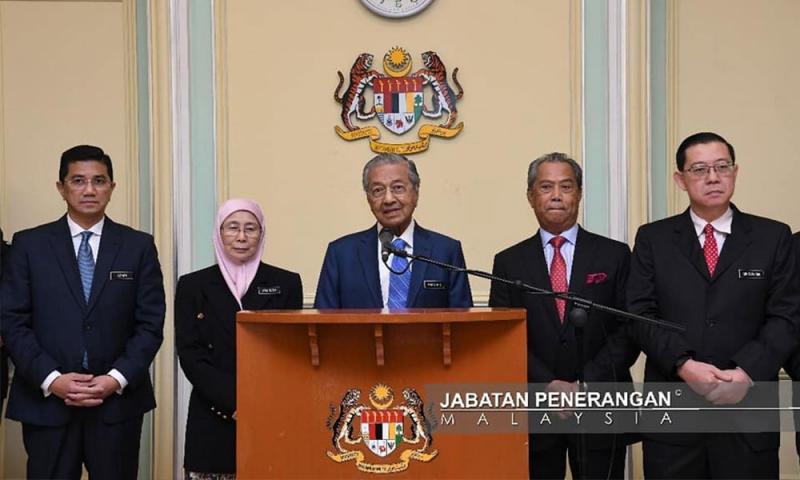LETTER | American political scientist Meredith Weiss has done extensive field research in Malaysia. The country needs more academics like her to cast light on the dynamics of Malaysia. However, the accolades stop there. Her article in Jacobin recently has all the drama and flair of a New Yorker literary piece. Yet, it went off on a tangent. How?
First, Weiss warned that the new electoral landscape is not necessarily new. While she did not warn of the spectre of Mahathirism, which implies a return to authoritarianism, she hinted strongly at the complexity of unravelling the National Economic Policy, which in her view amounted to all the same anyway. Again, how?
Entrenched Malay interests in the political, corporate and other sectors would be too deeply embedded. A single electoral victory from Pakatan Harapan, even one led by Dr Mahathir Mohamad, now the seventh prime minister of Malaysia, would not be enough to alter the dramatic and complex landscape.
Second, Weiss averred that any reforms would not be smooth sailing, especially when the tensions between the top members of the coalition look all but impossible to overcome.
Therefore, the significance of May 9, 2018, would fade in due course. The internal solidarity of the elites forged before and on that date would crack. While she didn't specifically mention the causal or ideological factor that could lead to its fissure or implosion, Weiss implied that their personal animus and histories are enough to warrant deep concern.
Third, Weiss argued that Pakatan Harapan is bound to make progress in light of the insidious practices of Umno that had set the bar so low, the mere rejection of corruption alone would be Harapan’s defining moment. Just by saying 'no' and the latter would enjoy more confidence from the public. Wrong.
In fact, Weiss is wrong on all counts. To begin with, the optic she adopted is one devoid of variant analysis. Even before the events took place, she had already claimed that everything else would either fail or fail to move forward. But then how does Weiss explain the power of the May 9 election?
Voters were given a choice between more billion-dollar handouts and subsidies by the Najib-led BN, or liberation from becoming the object of international ridicule.
While 45 percent of the voters rooted for Umno, this also marked the Malay behemoth’s dramatic fall from grace. From a high of 88 parliamentary seats in the 2013 election, Umno now only has 52 parliament seats, and the numbers are still dropping as elected Umno members declare themselves independent.
Corporate and economic reforms are bound to be difficult. Not for the reason of race or race-based preferential policies alone i.e., bumiputeraism, which pervades Weiss' article, but the massive size of the national debt due to liabilities from government-linked companies.
Research by Edmund Terence Gomez and his associates show close to 900 such entities have accepted some form of government bailout and are swimming in a sea of red ink. The gravity of the situation begins from the Gordian knot of these companies, not the problems rooted in bumiputeraism.
Finally, why should the egos of the different Harapan personalities matter, when the coalition has merely won the general election once? Unlike how Umno warlords, who had won in quick succession since 1955, had a sense of self-entitlement and invincibility, Harapan leaders know that if they screw up, the coalition will be booted out regardless of whether Mahathir or Anwar Ibrahim is at the helm. In other words, perform, or be put out to pasture.
Not surprisingly, some MPs had tried to remain in their comfort zones before the election but this backfired for some.
Tan Kee Kwong was not even nominated by his own party. He had to give up his Wangsa Maju seat to another PKR candidate.
Liew Chin Tong, marginally lost his seat in Ayer Hitam in Johor, thus depriving him of the chance to be the transport minister, as his successor Anthony Loke admitted.
Indeed, DAP fielded more Malay candidates under 40 across the board in GE14, more than even what Umno could attempt. These and other factors are more important to understand how the new Malaysia came to be rather than how old Malaysia will be resistant to change.
To begin with, sheer defiance of a kleptocratic regime is a given. Members of Umno like Bung Mokhtar even claimed that the ill-gotten gains of Najib Razak are the assets of Umno. Najib, meanwhile, insists many were gifts accumulated over his over 36 years in politics. Does he mean the business of being a politician is to be in business? Now that Najib has been arrested, more of the truth will be unveiled.
Anyway, Weiss is welcome to undertake more research on Malaysia. But she should understand that change, in fact, is happening at breakneck speed. There is the Council of Eminent Persons, the Harapan manifesto, and cabinet orders to reform the country within 100 days and over the next five years. Meanwhile, 17,000 political appointees have been terminated, and more are expected to face the same fate.
Even politically appointed ambassadors of Najib Abdul Razak will not be spared. Heads of government-linked investment companies, such as Abdul Wahid Omar of PNB, have resigned.
Rome was not built in a day. The Harapan government is learning through adaptation to see which elements of the previous policies can be kept, and which policies cannot be phased out immediately, or, suspended, in order to allow a thorough review of various projects with Chinese private construction companies.
If Weiss were in Malaysia at Mahathir’s side, she would be shocked at how the doyen of Malaysian politics is slashing the excesses of the previous government, in order to set things right. It is far too easy to be an armchair critic, and Weiss seems to have made that faux pas to critique from the safe confines of her ivory towers in US.
RAIS HUSSIN is a supreme council member of Bersatu and heads its policy and strategy bureau.
The views expressed here are those of the author/contributor and do not necessarily represent the views of Malaysiakini.






